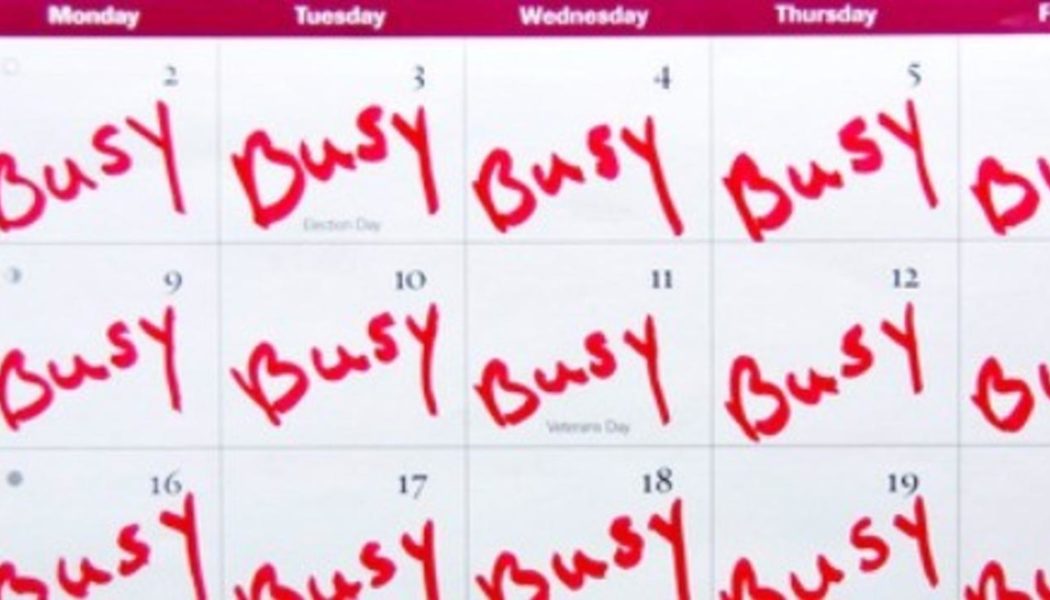
If the Devil can’t make you bad, he will make you busy. –– Lorrie McNickle
(repost)
My grandfather once wrote me: “Work smarter not harder. Always keep your priorities in mind. Apply Ockham’s razor often to life, shave away the unnecessaries. Better to do a few things well than many things poorly.”
Now and again, I examine my life in light of the call to simplicity. A simplicity audit of sorts. Here, simplicity means not just an absence of many things, but a unity of focus; a focus prudently determined by one’s priorities. Which means one must have one’s priorities defined, in mind, and being applied at all times.
I developed a custom over the years. A week or so before Advent, I step back and restate to myself my key priorities, which I articulate in a “rule of life.” With this in mind, I then reflect on the previous six or so months and evaluate my various choices and commitments; especially my use of time and the associated expenditure of my very limited energies. I ask myself: were these a help or hinderance to realizing my priorities? I get very specific about the good and bad fruits left behind in the wake of how I lived my life.
I also make it a point to ask my living Priorities — the people impacted by my way of living — to see how they think I’m doing. Like my wife, children, boss, spiritual director, a friend. Oh my! That’s enlightening. Living mirrors. This practice, I believe, is so important because it is very often the case that, when my life is poorly ordered, others suffer for it far more than I do. And that’s a big deal.
After I do all this audit work, I seek God’s guidance in prayer as I reevaluate and make new decisions about what to change, what to eliminate and what to (re)start.
Just to be more specific, my list of priorities (and so rule of life) includes concrete things like my commitment to daily prayer, to core relationships, my life rhythms (like eating, sleeping, exercise, reading, penances, Confession, spiritual direction), leisure activities, practice of the works of mercy, my mental health hygiene, and my career. Placing career last is very intentional for me.
Simplicity does not imply that one must not have an active, challenging or even exhausting life. As if it is a luxury for people with simple lives. Some of the most simple people I know work far harder and face more challenges than anyone I know. But they go to bed with a “good exhaustion” as their inner life is rightly ordered. Their outer days may be chaotic, with unexpected things coming at them from all directions, but their hearts have a rudder of direction found in their well-ordered priorities. They are going somewhere, and with their rudder they can determine whether or not they are going off course.
Rightly ordered love of God and others is their center,
Simplicity of heart means I must cease to be a house divided, reacting to life from a fragmented focus, dissipating my limited resources. Simplicity refuses to continue without a clear evaluation of why I am doing what I am doing. “First things first” as my mother would often say. It’s only when I know what is first, and what comes second, that can I answer: should I be doing what I’m doing?
With this in mind, each night before sleep we can engage in a reflective examination of the day, before the Face of God, to see what-is-what. Far too often, with an unexamined life, we wait until things rise to crisis-level — our health fails, our relationships suffer, our psyches burn-out — and only then assess what and why we are in fact doing what we’re doing.
Let me end by sharing a story related to all this. In the Advent of 2019, after my annual audit, I realized I had allowed my commitment to spending intentional and planned time with my wife Patti to erode. With my mom’s death that year, my rudder had been cracked. The effects of that neglect were painfully evident and not good.
On the day I was going to share with Patti my new resolutions, a remarkable thing happened. The very morning I wrote out my resolutions, a student in my Theology of Marriage class emailed me this quote he had happened on:
A marriage does not remain healthy
and survive hardship by chance.
Instead, such longevity is the result
of thousands of decisions
to move toward your partner,
rather than away,
especially when things are tough.
He followed this quote by saying, “This is what you said in class: the marriage covenant always comes before children, which makes marriage an axis not a rim.” Practice what you teach! God was so good to punctuate my commitment with the signature of his Providence.
“A stitch in time saves nine.” Better proactive than reactive.
How are you doing in this regard?
Simplify, do or die.






